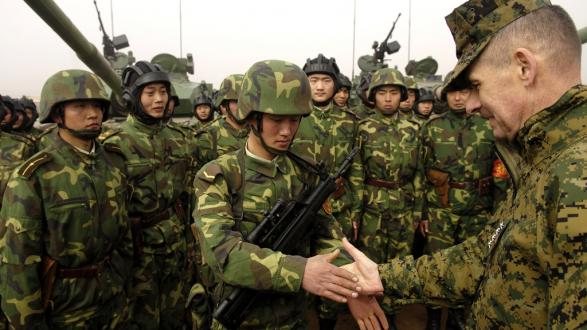In the third installment of the Edgerton Series on Responding to a Rising China, LA Times reporter Melissa Etehad moderated a discussion with Dr. Jonathan D. Pollack, nonresident senior fellow for foreign policy at the Brookings Institution’s Thornton China Center.
The following are key takeaways from the conversation:
- Pollack said the central question is whether or not China and the United States can manage their mutual power relations. Can the United States accommodate China’s emergence as an autonomous great power? In turn, can China accept the United States’ continued claims to international leadership? If the United States is, in fact, troubled by China’s rise, what is the United States prepared to do about it?
- On the day of the discussion, China commissioned its first domestically manufactured aircraft carrier. This could be an indication of things to come. China’s advanced military will have the ability increasingly to protect and pursue its national interests around the world.
- Pollack questioned why U.S. politicians in both the Democratic and Republican parties are increasingly agitated about China’s rise on the world stage. “There is, to be frank, a psychological discomfort in the United States about a world in which the United States will no longer be singularly dominant. We better get used to that, and it’s more than just China.”
- There’s a narrative that the United States has been had or manipulated by China over the last 40 years. That’s a problematic way of looking at the relationship, Pollack argued.
- Etehad asked if human rights is an area where the United States can influence or cooperate with China. Pollack answered, “Right now, no.” So where can the two countries cooperate? “The government-to-government relationship is broken. It’s not just the trade war. We should avoid hot button issues and focus on areas of common ground.”
- President Trump said the trade war would be easy to win. If he expected China to wither and fold, it hasn’t worked out that way at all, Pollack said.
- The United States should be careful about predicting what China might do in the future.
- China isn’t just giving money away in different areas of the world. They’re invested and involved in a way the United States, frankly, is not.
- The U.S. and China need to both approach each other with a mix of cooperation and competition, and actively seek disengagement from each other.
Listen to the full conversation below:
_______________________
Justin Chapman is the Communications Officer at the Pacific Council on International Policy.
The Edgerton Series on Responding to a Rising China aims to provide proactive and forward-looking solutions to some of the most complex local, regional, and global issues facing the United States and China today, through regular engagement in debates and discussions with the foremost experts in Chinese affairs. The Edgerton Series is made possible by generous support from the Edgerton Foundation. We thank Dr. Bradford and Ms. Louise Edgerton for their continued support of and dedication to the Pacific Council.
The views and opinions expressed here are those of the speakers and do not necessarily reflect the official policy or position of the Pacific Council.




